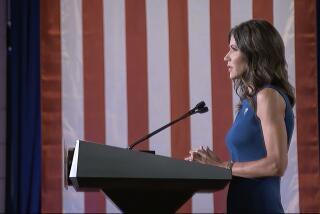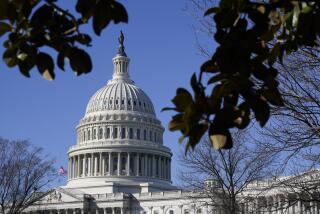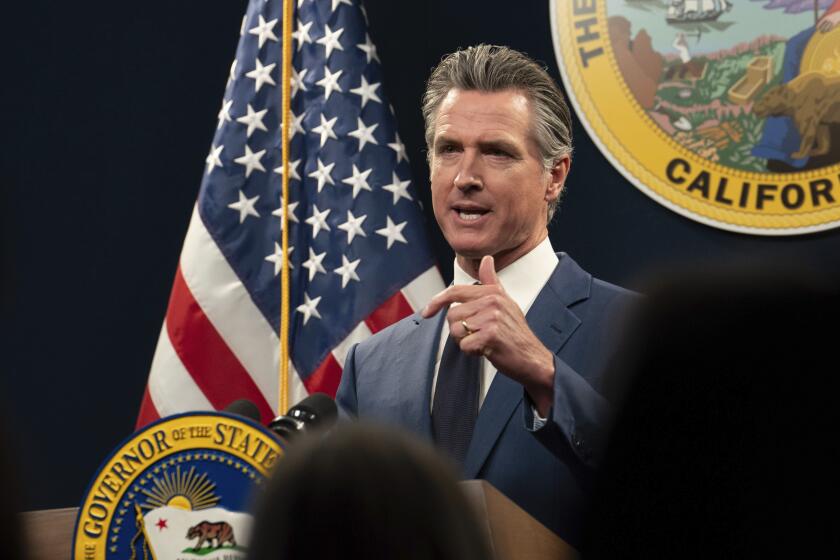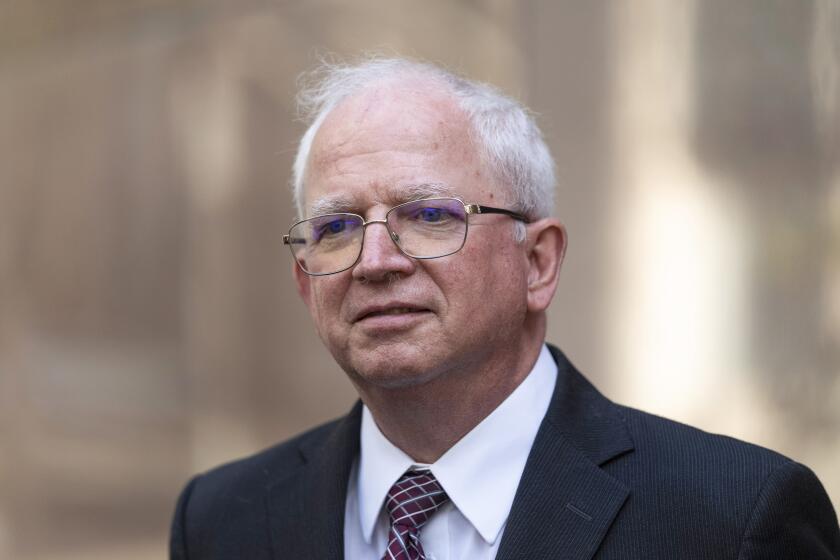Biden Calls for Tough Trade Laws : Presidential Hopeful Backs School Reform, Strong Personal Role
Outlining his economic platform as a 1988 White House contender, Democratic Sen. Joseph R. Biden Jr. of Delaware on Thursday called for tough new trade laws, educational and financing reforms and, most importantly, vigorous personal leadership by the next President to reassert U.S. control over its future.
“Control over our economic destiny has been endangered,” Biden declared in the first of two speeches to be delivered at the University of Pennsylvania’s Wharton School of Economics and released here by his campaign office. “The risk is that we will no longer lead the world; that we will no longer control American jobs and American assets; that our economy will be held hostage to the wishes and whims of foreign corporations and foreign powers.”
Presidential Power
The remedy, he argued, will depend mostly on forceful and innovative use of presidential authority and power. Recalling President John F. Kennedy’s personal intervention to force a rollback of a steel industry price increase, Biden said: “That’s what a President should do today: Call the captains of industry and the chieftains of labor into his office . . . and say to them, ‘Here’s what successful businesses here and abroad are doing. . . . Why don’t you go out and get the job done too?’ ”
Biden’s incipient bid for his party’s nomination has so far been noted more for the passion of his rhetoric than for the substance of his policy ideas. This week’s economic speeches, to be followed by addresses on foreign policy and poverty, are part of what his aides describe as an effort to provide an underpinning of issues for his candidacy, which he will formally announce June 9.
To deal with the U.S. trade imbalance, Biden rejected what he called “pure free trade” because of unfair practices by other nations, and protectionism because, he said, it “smacks of defeatism.” Instead, he outlined a series of legislative remedies, similar to those included in the trade bill recently passed by the Democrat-controlled House.
Plan Held Less Severe
But Robert Litan, a Brookings Institution senior fellow who advised Biden on the speeches, contended that the senator’s approach was not as severe as that advocated by Missouri Rep. Richard A. Gephardt, a rival for the Democratic nomination who has made trade his prime issue.
Litan noted that Biden supports presidential action to retaliate against nations running a trade surplus but would limit it to the amount directly caused by unfair trade practices. Gephardt, meanwhile, favors retaliation aimed at wiping out the entire surplus.
Biden called for action against unfair trade practices, such as “industry targeting”--foreign attempts to eliminate an entire American industry by favoring the same industry domestically--and “diversionary dumping,” in which a foreign country markets a product in a third country at a price below the cost of production in order to deny that market to American goods.
Warning on Firms
At the same time Biden warned against “narrow-minded corporate executives--the corpocracy,” who he charged try to exploit the nation’s trade problems and turn them to their own advantage. He cited the case of U.S. Steel Corp., which he charged actually cut capital investment, fired thousands of workers and shut a number of its plants after being guaranteed a floor price for steel sold in America to help offset the damage suffered from foreign competition.
Among other proposals in other economic areas are:
--Stock market regulation. To help companies avoid paying huge bonuses to corporate raiders in return for their dropping takeover attempts, legislation should be enacted to force profits made by raiders through such deals to be returned to the company.
--Education. The student loan program should be expanded into a lifetime service, available to working adults as well as students, with repayments tied to future income and a total borrowing ceiling of $50,000.
--Unemployment. To encourage the unemployed to take new jobs more quickly, a worker who found new employment at lower pay than his past wages would receive a restoration of a portion of the pay cut from the government.
But more important than any of these proposals, Biden contended, was a commitment by the President himself to use his personal and institutional prestige to “mobilize America” with the goal of regaining its world economic advantage.
“Only by setting in motion a whole series of changes in a million places outside of Washington can a President hope to achieve long-term, really meaningful improvement of our economic position,” Biden said. As an example, he cited education, where he contended sweeping changes were needed, including lengthening the school day and the school year, strengthening curricula, increasing teachers’ salaries and raising standards for their performance.
‘Reforming Our Schools’
“The next President could use his press conferences and televised messages to talk about reforming our schools, spending as much time as this President or his right-wing allies have spent talking about prayers they want school boards to write or books they want banned,” Biden declared.
In the field of day care, Biden said he would set up a White House day-care center to encourage private industry to follow suit. “Presidents set powerful examples,” he said.
In the speeches, Biden characteristically relied heavily on imagery and figures of speech. He used the successful U.S. comeback to recapture the America’s Cup in international yachting competition as a metaphor for the declining American position in the world economy, noting that the United States had dominated the races for years before losing the trophy to Australia.
Quoting Dennis Conner, captain of the Stars and Stripes, Biden said the American success in regaining the cup reflected “the American will to compete anywhere in the world and the American ability to win.” But he questioned whether the United States could win again in the next competition in 1991, when America would face challenges from West Germany and Japan, two new entrants and, of course, two major U.S. rivals for international markets.
More to Read
Get the L.A. Times Politics newsletter
Deeply reported insights into legislation, politics and policy from Sacramento, Washington and beyond. In your inbox three times per week.
You may occasionally receive promotional content from the Los Angeles Times.






